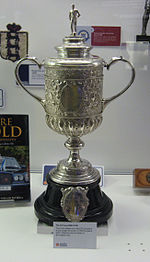1880 FA Cup final
 | |||||||
| Event | 1879–80 FA Cup | ||||||
|---|---|---|---|---|---|---|---|
| |||||||
| Date | 10 April 1880 | ||||||
| Venue | Kennington Oval, London | ||||||
The 1880 FA Cup Final was contested by Clapham Rovers and Oxford University at the Kennington Oval. Clapham Rovers won 1–0, the only goal being scored by Clopton Lloyd-Jones.[1]
Overview
Weather
At the start of the match, a strong and cold north-easterly wind blew into the faces of the Oxford team and the wind neutralised many of their kicks but it eased considerably after half-time.[2][3]
Scoring
In the first half, Clopton Lloyd-Jones attempted to score twice, with a shot from the left which glanced off a goalpost, and a centre kick downfield which was saved by the Oxford goalkeeper Percival Parr. The ball hit the Oxford crossbar with a shot from Edward Ram and Harold Brougham shot just over the same bar.[2]
In the second half, six minutes before the close of time, the deadlock was broken when Francis Sparks conducted the ball to within "about six yards of the University goal". Although Oxford's Charles King attempted to stop the ball with a weak mis-kick, Lloyd-Jones, "who had followed well up shot it between the posts. This feat quite 'brought down the house.'"[4] According to The Field magazine's report, there was "vociferous cheering, throwing up of hats, and other demonstrations of delight from their supporters." At the game's end, Lloyd-Jones, and his team captain Robert Ogilvie, were specially cheered by the crowd.[5] At 21 years and 150 days Lloyd-Jones was the 'baby' of his team and the youngest Cup Final scorer to date.[6]
Match details
C. Rovers
|
O. University
|
|
|
In fiction
This match was subject of a spoof anecdote, written in 2006 by journalist John Walsh as a guest editor of a charity issue of The Independent in a list of five "least successful guest-star interventions in history", in which Oscar Wilde was a guest player on the Oxford team, but demurred from a chance to score at the last minute.[7] The anecdotes are purely comedy fiction. Wilde was known for a disdain of 'manly sports' (apart from occasional boxing at university).[8]
References
- ^ a b 1880 FA Cup Final on Sporting Chronicle (archived, 14 Mar 2008)
- ^ a b Warsop, Keith (2004). The Early F.A. Cup Finals and the Southern Amateurs, A Who's Who and Match Facts. SoccerData. p. 50. ISBN 1-899468-78-1.
- ^ Final 1880 on FA-Cup Finals (archived, 11 Mar 2007)
- ^ "Football. Association Challenge Cup". The Field. 17 April 1880.
- ^ "The Football Association Challenge Cup. Clapham Rovers v Oxford University". The Sportsman. 12 April 1880.
- ^ Lloyd-Jones surpassed Charles Clerke (Old Etonians), who was 21 years 173 days at the 1879 Cup Final, and then surpassed in turn by Teddy Wynyard (Old Carthusians), who was aged 20 years 8 days at the 1881 Cup Final.
- ^ John Walsh: Tales of the City on The Independent, Thursday 16 May 2006 (the other anecdotes involved Bob Dylan, Groucho Marx, Philip Larkin and Margaret Thatcher)
- ^ Ellmann, Richard (1988). Oscar Wilde. Vintage Books: New York. p. 39. ISBN 978-0-394-75984-5.
